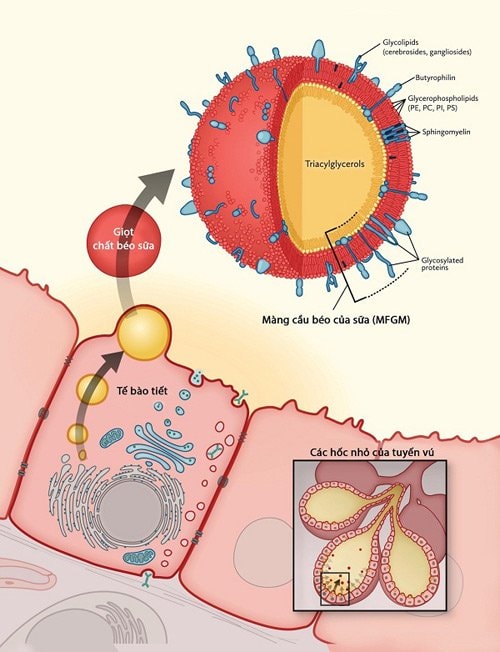New discovery of fat globule membrane in milk
The research findings on MFGM play an important role in nutritional science. The addition of MFGM to infant formula may help to narrow the nutritional and functional gap between infant formula and human milk.
Helps support children's cognitive and brain development
Milk Fat Globule Membrane (MFGM) is a membrane that surrounds fats secreted from the mammary glands of mammals. This is a component found in breast milk that helps support cognitive and brain development in children.
 |
| The total MFGM only accounts for 2-6% of the milk fat globule size it encapsulates but they are very important. |
The entire MFGM accounts for only 2-6% of the size of the milk fat globule it encloses, but they are important because they are made up of nutrients that participate in the body's functional activities - rather than just providing nutrients to be released as energy.
With a 3-layer structure of phospholipids along with glycolipids, proteins, glycoproteins, cholesterol and other fats, clinical studies over the past 20 years have shown that MFGM has a special impact in supporting the growth and development of the brain/central nervous system and intestines as well as enhancing intestinal immunity.
First of all, the lipid component of MFGM contains a lot of phospholipids, glycosphingolipids and cholesterol. Phospholipids and sphingolipids play a major role in brain neurons during fetal development as well as promoting neuronal growth, differentiation and synaptic connections in the first year of life.
In addition to lipids, the outer layer of MFGM contains a number of proteins. Analysis has revealed at least 191 different proteins in human milk MFGM and similar amounts in purified cow's milk. Of these, 74 proteins are of particular interest because many of them are known to have biological activity and health benefits. Nearly half of the proteins identified have cell signaling functions.
Glycosylated proteins in MFGM also aid in digestion and preclinical studies have shown antibacterial properties.
Bridging the gap between formula and breast milk
MFGM is an important component of breast milk and beneficial for the development of children, but has long been absent from formula. That is why MFGM is starting to be focused on and supplemented into formula.
Despite these differences, cow's milk MFGM generally contains a similar fat and protein composition to human milk MFGM. Therefore, the addition of these nutrients to infant formulas offers the opportunity to develop a formula that more closely resembles human milk in composition and function, providing potential health benefits for bottle-fed infants.
In fact, there have been many clinical studies that have shown differences between babies who used MFGM-supplemented formula and other babies.
A study by Timby et al. (published in Am J Clin Nutr, 2014) showed that feeding infants with MFGM-supplemented formula until 6 months of age showed improved cognitive performance at 12 months compared to the control group. This result was comparable to the group of breastfed infants.
Another study by Timby et al. (published in JPGN, 2015) demonstrated that feeding infants with MFGM-supplemented formula up to 6 months reduced the incidence of acute otitis media. It also reduced the incidence and need for antipyretics during the period of MFGM-supplemented formula use.
Many of the compounds in MFGM are more or less lost during milk processing, depending on the technology. However, recent advances in technology have made it possible to separate MFGM from fat globules, allowing for the addition of MFGM to cow's milk in a purified form.
In addition, many clinical studies on children have proven that the use of MFGM-supplemented milk powder is safe and does not cause allergies. MFGM supplementation has effects from very low birth weight premature infants to normal children, to preschool age. Notably, the effects last long after the period of discontinuation of use.
Nutrition and early child development Nutrition plays a very important role in infancy and childhood. Proper nutrition at this stage is not only vital to the child's development and growth but also lays the foundation for a healthy life later on. The first 2-3 years of life are the period of the child's most rapid growth. The child's weight will double within 4-6 months after birth and triple in the first year (up to 10kg). The child's height increases by 50% in the first year and by 75% after 2 years. This is also the period of very rapid development of the nervous system. In fact, the brain size will triple in the first two years, reaching 85% of the brain weight of an adult. Therefore, providing a balance of nutrients - protein, carbohydrates, fats and micronutrients (vitamins and minerals) is very important for early development, helping children develop their full health and cognitive potential when they grow up. |
According to vietnamnet








